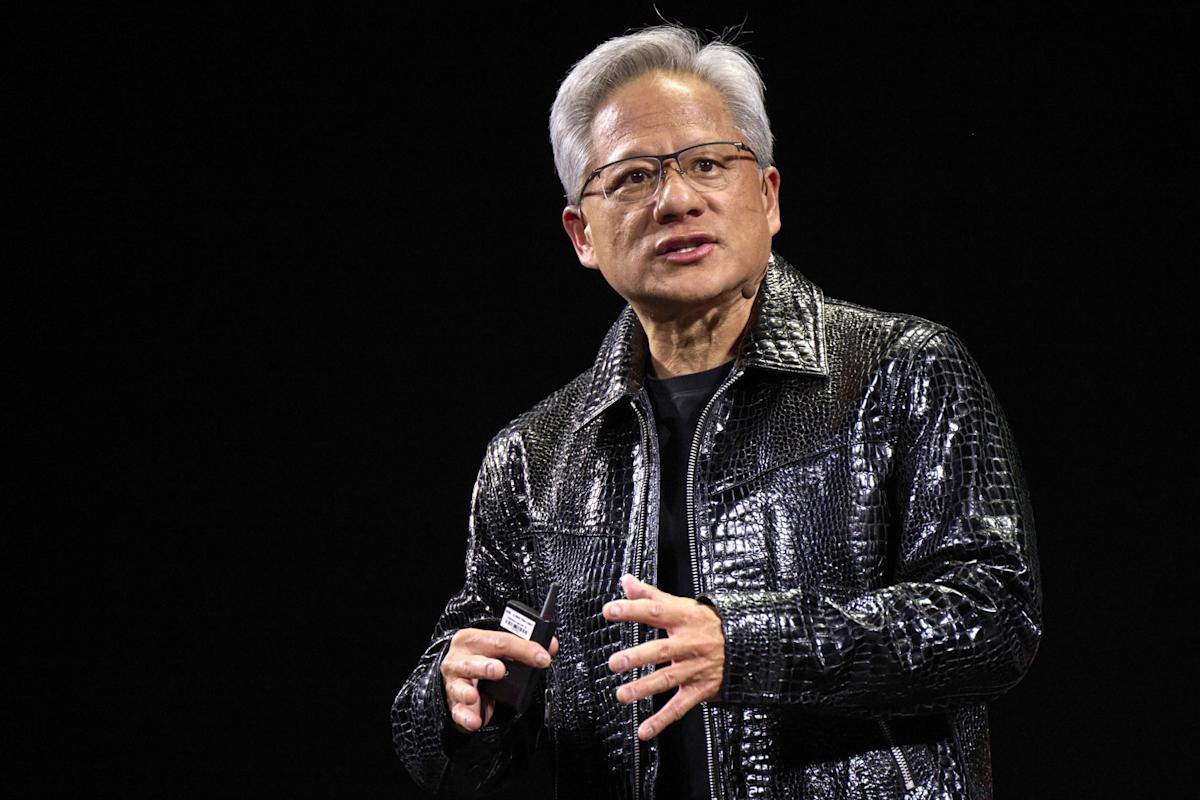Nvidia CEO Jensen Huang. Photographer: Bridget Bennett/Bloomberg
(Bloomberg) — Nvidia Corp. has instructed component suppliers including Samsung Electronics Co. and Amkor Technology Inc. to stop production related to the H20 AI chip, the Information reported, citing unidentified sources.
Nvidia issued those orders this week after Beijing urged local companies to avoid using the H20, the Information said, referring to a chip designed specifically for the Chinese market. The US company’s shares slid about 1.3% in US pre-market trading.
Most Read from Bloomberg
A production suspension would raise questions about fundamental demand for the H20, a less-powerful version of Nvidia’s cutting-edge AI accelerators that competes with similarly capable chips from the likes of Huawei Technologies Co. and Cambricon Technologies Corp. The latter company’s shares soared as much as 20% Friday, leading a rally in fellow Chinese chip stocks.
Nvidia CEO Jensen Huang.Photographer: Bridget Bennett/Bloomberg
Nvidia and Advanced Micro Devices Inc. both recently secured Washington’s approval to resume lower-end AI chip sales to China, on the controversial and legally questionable condition that they give the US government a 15% cut of the related revenue. But their Chinese customers are under pressure to adopt homegrown chips instead — part of a broader objective to build a world-class domestic industry and wean the country off US technology.
In past weeks, Chinese authorities have sent notices to a range of firms discouraging use of the less-advanced semiconductors, Bloomberg News has reported. That followed warnings about alleged security risks in the H20, after Washington officials said they were considering ways to equip chips with better location-tracking capabilities.
The scrutiny coincides with the growing capabilities of homegrown alternatives to Nvidia designed by Huawei and its peers. On Thursday, Chinese AI phenomenon DeepSeek said its latest AI model was customized to work with next-generation Chinese-made AI chips, without elaborating.
WATCH: Nvidia has instructed component suppliers to stop production related to the H20, The Information reported, Ed Yardeni of Yardeni Research explains what it could mean for the AI race.Source: Bloomberg
Chief Executive Officer Jensen Huang on Friday said he was surprised when Beijing expressed those concerns and was now addressing that in talks with the authorities. But he reiterated that the H20 houses no such security backdoors. Huang, who was in Taiwan to discuss his upcoming Rubin chip with Taiwan Semiconductor Manufacturing Co., said Nvidia’s also in talks with Washington about a potential follow-up to the H20 for China, though that depended on the Trump administration.
Story Continues
“Offering a new product to China for AI data centers — the follow-on to the H20 — that’s not our decision to make. It’s up to of course the US government,” Huang told reporters during an impromptu briefing at the airport. “We’re in dialogue with them but it’s too soon to know.”
What Bloomberg Intelligence Says
Nvidia’s decision to halt H20 chip production, as reported by The Information, follows the Chinese government urging local companies to avoid using the chip and creates fresh uncertainty over when Nvidia’s China business can recover. We had previously projected H20 shipments to China would resume no earlier than the end of this year. Although a delay might temper optimistic estimates for China, robust US hyperscaler demand and Blackwell adoption should offset the impact on Nvidia this year.
– Kunjan Sobhani and Oscar Hernandez Tejada, analysts
Click here for the research.
It’s unclear whether the Information’s story relates to new production of the H20 or stockpiles of unfinished AI accelerators.
Semi-finished semiconductors are “piling up” at Amkor, which packages chips for customers like Nvidia, the Information reported. Representatives for Amkor didn’t immediately respond to requests for comment after normal hours. A Samsung representative declined to comment.
Nvidia, which wrote off $5.5 billion of H20 chips for China after the Trump administration decided to ban the product, is still sitting on unsold inventory. Huang has said the US reversal of that ban over the summer could help Nvidia recover some but not all of that writedown.
Nvidia — which is due to report earnings next week — has repeatedly denied it builds backdoors or location-tracking into its product. “We constantly manage our supply chain to address market conditions,” an Nvidia spokesperson said in response to the Information report.
“As both governments recognize, the H20 is not a military product or for government infrastructure. China won’t rely on American chips for government operations, just like the US government would not rely on chips from China. However, allowing US chips for beneficial commercial business use is good for everyone.”
Tracking the US-China Trade Fight and What Comes Next: QuickTake
–With assistance from Nick Turner, Yoolim Lee and Abhishek Vishnoi.
(Updates with shares, analyst’s comment from the second paragraph.)
Most Read from Bloomberg Businessweek
©2025 Bloomberg L.P.

